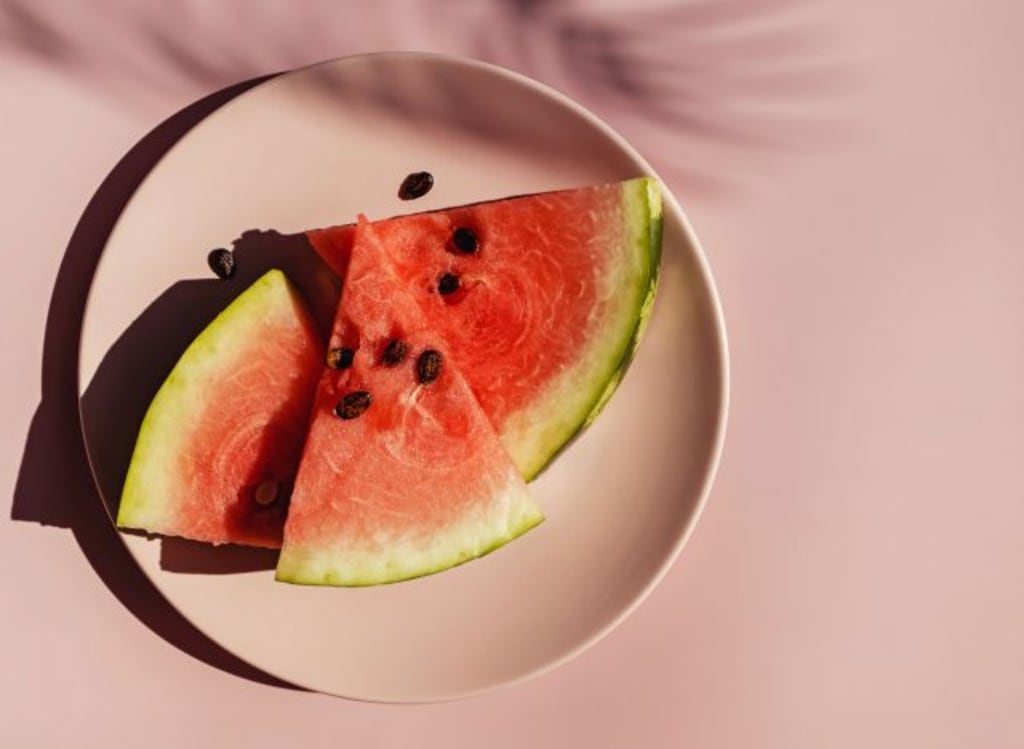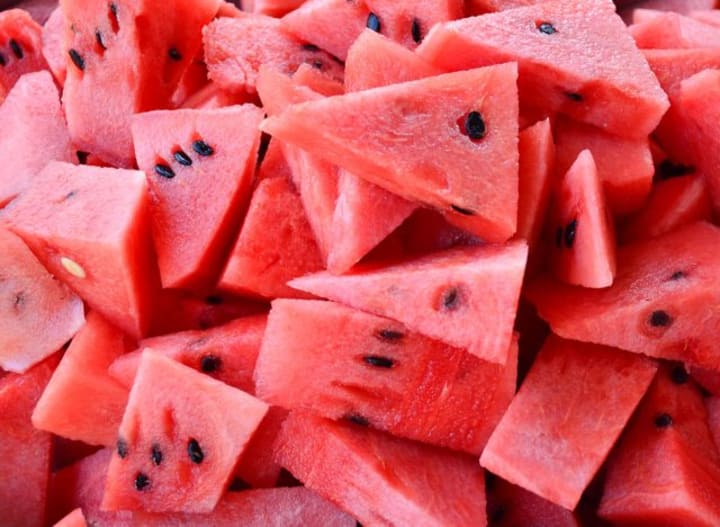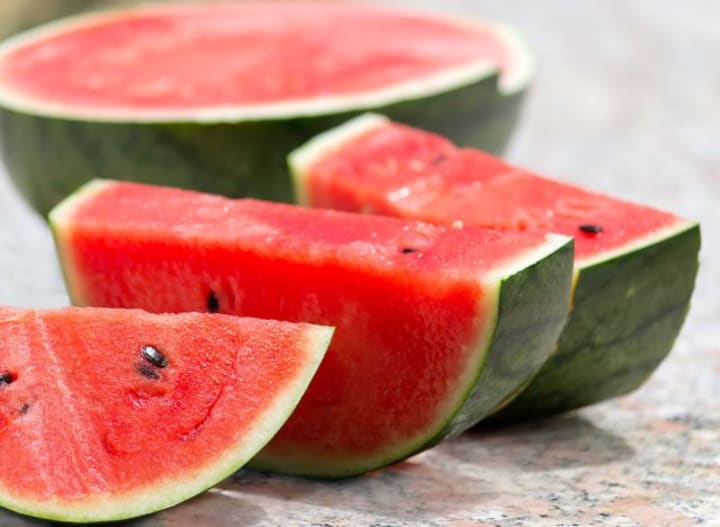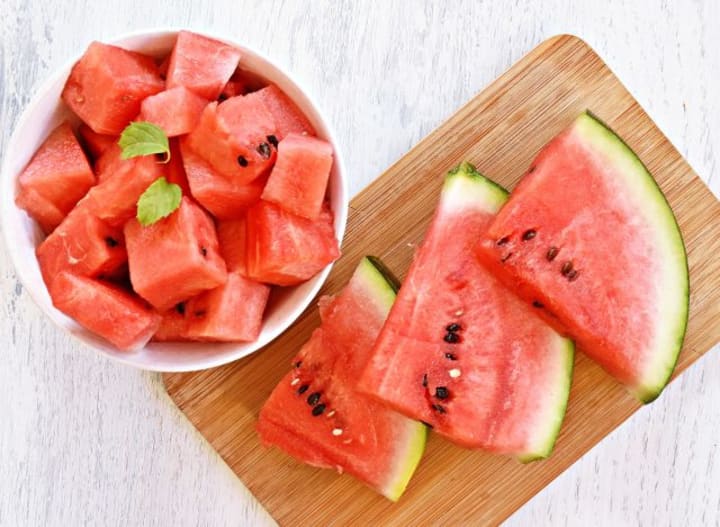Is watermelon healthy? 15 Effects of Eating It That Are Backed by Science
Do the good things about eating watermelon outweigh the bad things that could happen? Read on to learn more.

This is the best time of year to eat a lot of these huge, sweet, and very hydrating fruits. Melons are the candy of nature, and each one has its own nutritional power. Watermelons are full of antioxidants, vitamins A and C, and a lot of other good things for you. One thing that makes them stand out is that, cup for cup, this sweet treat is actually a low-sugar fruit when compared to other tropical fruits. (In fact, a single cup of cubed watermelon only has 9 grams of sugar!)
With its light feel and low number of calories, watermelon may seem like an easy snack to enjoy. However, we all know that balance is the key to a healthy lifestyle, and that too much of a good thing usually has some kind of negative effect. So, is watermelon healthy?
To find out, i chose to look at some of the scientifically proven benefits and drawbacks of eating watermelon. Read on to find out what could happen if you eat a lot of this sweet summer fruit. If you want to learn more about another cool, vitamin C-rich fruit, check out 7 Surprising Benefits of Eating Grapefruit.
The Nutrition Facts About Watermelon

According to the USDA says that one piece of watermelon, which is about 286 grams, will give your body:
85.8 calories 1.7 grams protein
0.4 grams fat
21.6 grams carbs
1.4 grams fiber
17.7 grams sugar
80.1 milligrams vitamin A (9% DV)
23.2 milligrams vitamin C (26% DV)
0.13 milligrams vitamin B6 (8% DV)
320 mg of potassium (7% of the daily value)
Still, eating watermelon can cause a few side effects, some of which may be surprising. Let's take a deep look into the science behind what can happen to your body when you eat watermelon. This will help you understand the benefits of eating this fruit as well as some of the possible bad effects.
12 Good Reasons to Eat Watermelon

Watermelon is not only a sweet, refreshing snack, but it also has many health benefits. Here are 12 ways that eating this melon can help your health, from keeping you hydrated to keeping your blood pressure in check.
1. Eating watermelon can make your defense system stronger.
Since watermelon has more than 25% of your daily amount of vitamin C, it can't help but strengthen your defense system. Many studies have shown that this important vitamin helps the immune system work well. Research shows that getting your vitamin C from nature's candy, like fruit, can help to boost collagen production, which is important for maintaining cell structure and immune health.
2. You'll get a little more water.
Watermelon is the best food for keeping your body hydrated. It has 92% water, making it one of the things with the most water on the world. Staying hydrated is important for all of your body's processes to work well. It avoids tiredness and keeps your energy up, eases headaches, helps flush waste out of the body, and improves your skin's tone and flexibility so you can keep looking young. So the next time you're thirsty on a hot day and want a sweet taste, try cutting into a juicy watermelon.
WHAT HAPPENS TO YOUR BODY IF YOU DON'T DRINK ENOUGH WATER?
3. You'll feel better after working out.
One thing that can make it hard to stick to a regular exercise routine is knowing that you'll probably feel sore after a hard workout, especially if you're just getting back into shape after a break. People may say, "No pain, no gain," but I think we can all agree that a little less pain after a workout would make it a lot more fun. This is where watermelon comes in. One small study from 2013 that was published in the Journal of Agricultural and Food Chemistry found that athletes who drank watermelon juice while working out felt less sore the next day and had a slower heart rate. Researchers think that this is because watermelon has an organic amino acid called L-citrulline, which helps your arteries open and improves blood flow.
4. It might help kill cancer cells.
Watermelon has a lot of vitamins that help get rid of free radicals in the body. If free radicals aren't stopped, they can cause cancer cells to grow. But how is it that watermelon is able to do this? Well, like other red fruits that are popular in the summer (looking at you, tomatoes), watermelon has a lot of lycopene, which is a powerful antioxidant that can help prevent cancer. Antioxidants like lycopene help fight cancer, slow down the aging process, and fix the body's broken cells. People may think that tomatoes are the only good source of lycopene, but watermelon has almost 40% more lycopene than raw tomatoes.
Memorial Sloan Kettering Cancer Center says that scientists think lycopene might protect DNA from harm, stop cancer cells from growing, and boost enzymes that break down products that cause cancer. In fact, a clinical study that was published in the International Journal of Molecular Sciences showed that lycopene pills might stop localized prostate cancer from spreading.
5. It might keep your eyes healthy.
Carotenoids like lycopene are linked to a lower chance of macular degeneration, a wear and tear on the eye that gets worse with age and is the top cause of vision loss in people over 60. Watermelon is full of both lycopene and vitamin C, another powerful antioxidant that is good for your eyesight. In the famous Age-Related Eye Disease Study, which looked at 5,000 people ages 55 to 89, researchers found that people with mild macular degeneration slowed the disease's development by taking beta-carotene, vitamin C, vitamin E, and zinc tablets every day.
6. It makes you feel fuller.
After a meal, satiety is the feeling of being full and happy. Finding foods that make you feel fuller is a good way to keep your portion sizes in check. When you're full, it's easier to eat the right amount. The total amount of food eaten is an important factor in feeling full. So, being able to eat more gives a person the feeling of being full. This is because watermelon has a lot of water in it. In other words, because the fruit is so juicy, you can eat more of it without getting as many calories as you would with other fruits.
7. It might make your blood pressure go down.
Let's look at this more closely: The USDA says that there are 170 milligrams of potassium in a cup of watermelon chunks. The Mayo Clinic says that this important element and nutrient helps lower the effects of salt on blood pressure and is also important for how well the nervous system works. And, in fact, a small study at Florida State University of 13 middle-aged, overweight men and women with high blood pressure found that watermelon could lower blood pressure both when people were at rest and when they were stressed. "After taking watermelon extract, the pressure on the aorta and the heart went down," said Arturo Figueroa, an associate professor and the study's author. The study was published in the American Journal of Hypertension.
8. It can help you keep your weight in check and even help you lose weight.
A 2019 study in the journal Nutrients found that eating fresh watermelon chunks as a starter or in a salad could also help people lose weight.
33 overweight or fat men and women took part in the study. For four weeks, they were told to eat 2 cups of fresh diced watermelon every day. During a separate four-week time, the subjects were asked to eat a low-calorie cookie snack every day that had the same number of calories as the fruit food. The subjects ate and worked out as usual.
At the end of the test, those in the watermelon group said they were fuller than those in the cookie group. They said they didn't feel like eating for up to 90 minutes after eating watermelon. The cookies didn't change how hungry they were, though. The researchers also found that when people snacked on fruit for four weeks, they lost weight, but when they ate low-fat cookies, they gained weight. The waist-to-hip ratio was also lower at the end of week four when fruit was eaten instead of cookies.
9.The seeds are a delicious snack.
Don't accept the old story that if you eat watermelon seeds, vines will grow in your intestines. In fact, watermelon seeds are good for you and taste good when roasted like pumpkin seeds. The International Journal of Current Research's "Comprehensive Review on Watermelon Seed—The Spitted One" says that the watermelon's "neglected food parts" are a good source of protein, magnesium, iron, zinc, and monounsaturated "good" fats. Sprinkle the seeds with a little olive oil and roast them on a baking sheet for 15 minutes at 350 degrees F, turning them halfway through. When they are done, sprinkle them with cinnamon, chili powder, or Old Bay.
10. It might make you hornier.
In 2008, a press release from Texas A&M University about a study done there made headlines all over the world when a researcher said that the phytonutrient citrulline, which is found in watermelon in large amounts, could help improve blood flow. When you eat watermelon, enzymes in your body change citrulline into arginine, an amino acid that is good for your heart and circulatory system because it softens blood vessels and makes them more flexible. Both men and women need good blood flow to get aroused. But you would have to eat a lot of watermelon to get an arginine boost, so this is just an idea. A huge amount of watermelon. In another study, which was published in the journal Nutrition, it was found that volunteers needed to drink three to six 8-ounce glasses of watermelon juice every day for three weeks to raise the amount of arginine in their blood by 12% to 22%.
11. It's good for your heart.
In 2014, experts from Purdue University and the University of Kentucky found that a substance in watermelon lowers the amount of cholesterol in the blood and the amount of plaque that builds up in the arteries. In the trial, scientists gave two groups of mice a meal high in saturated fat and cholesterol. One group got water with watermelon juice in it, and the other group got water with a solution that had the same amount of carbs as the watermelon juice. The mice that drank the watermelon juice had half as much LDL, or "bad" cholesterol, in their blood and half as much plaque in their vessels as the other mice. Also, the mice in the test group gained 30% less weight than the mice in the control group. Researchers think that a chemical in watermelon called citrulline may be to blame for the good result.
12. It might help keep asthma away.
Some experts think that asthma is caused by free radicals that cause inflammation. Watermelon and other fruits and veggies that are high in vitamin C may help fight these free radicals. A meta-analysis published in the journal Nutrients looked at seven studies and found that six of them showed that eating more fruits and vegetables may help protect against lung inflammation and asthma.
Is watermelon good for you?

From what science has shown, watermelon is good for you. This juicy fruit is a good source of important vitamins and has been shown to help with water and heart health, among other things. It's important to be aware of how much sugar it has, especially if you have diabetes, but if you eat it in moderation, it won't raise your blood sugar as much.
About the Creator
Jacob Damian
Whether you're looking to learn something new, explore different perspectives, or simply satisfy your curiosity, I can offer you insights and perspectives that you may not have considered before. With my ability to process and analyse.






Comments
There are no comments for this story
Be the first to respond and start the conversation.